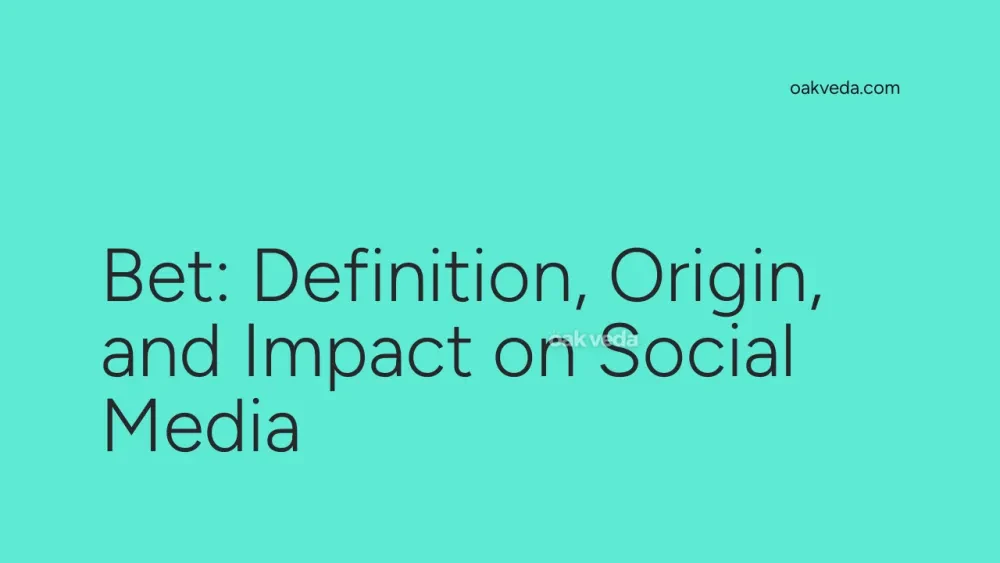
What is "Bet"?
"Bet" is a popular slang term used extensively on social media platforms and in everyday conversations. In its most common usage, "bet" is an affirmative response, similar to saying "okay," "sure," or "agreed." This versatile expression has become a staple in online communication, particularly among younger generations.
The term "bet" can be used in various contexts:
- As an agreement or affirmation
- To express confidence or certainty
- To acknowledge a statement or plan
For example, if someone suggests, "Let's meet at the mall at 3 PM," a response of "Bet" would indicate agreement with the proposed plan.
Origin and Development of "Bet"
The term "bet" originates from African American Vernacular English (AAVE) and gained popularity in the 1990s, particularly among hip-hop groups on university campuses. Over time, it has evolved and spread beyond its original context, becoming widely adopted in mainstream social media culture.
The journey of "bet" from AAVE to widespread usage highlights the significant influence of Black culture on contemporary language and digital communication. As social media platforms have grown, so has the reach and adoption of this term across diverse communities.
How "Bet" Works in Social Media Communication
On social media, "bet" functions as a quick, casual way to express agreement or acknowledgment. Its brevity makes it particularly well-suited for platforms like Twitter, where character limits encourage concise communication. The term's versatility allows users to convey a range of sentiments with a single word, making it an efficient tool for online interactions.
Some common uses of "bet" in social media conversations include:
- Confirming plans: "Movie night tomorrow?" "Bet!"
- Expressing belief: "I'll definitely ace this exam." "Bet."
- Showing support: "I'm launching my new podcast next week!" "Bet, I'll be listening!"
Popular Examples of "Bet" in Social Media
The widespread use of "bet" has led to its appearance in various social media contexts:
- Memes: Images or videos featuring "bet" as a punchline or reaction
- Twitter threads: Users responding with "bet" to show agreement or support
- TikTok videos: Content creators using "bet" in skits or as part of trending challenges
- Instagram captions: Influencers and users incorporating "bet" into their post descriptions
These examples demonstrate how "bet" has become deeply ingrained in social media culture, transcending its original usage to become a versatile and widely recognized term.
Impact of "Bet" on Social Media Culture
The popularity of "bet" has had several notable impacts on social media culture:
- Language evolution: "Bet" exemplifies how social media accelerates the adoption and spread of slang terms.
- Cultural exchange: The term's journey from AAVE to mainstream usage highlights the influence of Black culture on digital communication.
- Generational markers: The use of "bet" can serve as an indicator of generational differences in online communication styles.
- Brevity in communication: "Bet" aligns with the trend towards more concise, efficient online interactions.
How Brands and Influencers Use "Bet"
As "bet" has gained popularity, brands and influencers have incorporated it into their social media strategies:
- Brand voice: Some companies use "bet" to appear more relatable and youthful in their social media communications.
- Engagement tactics: Influencers might use "bet" to encourage audience interaction and create a sense of casual conversation.
- Content creation: The term is often featured in sponsored content, particularly when targeting younger demographics.
However, brands and influencers must be cautious when using slang terms like "bet" to avoid appearing inauthentic or appropriating culture inappropriately.
Future Trends Related to "Bet"
As with many slang terms, the future of "bet" in social media is difficult to predict. However, some potential trends include:
- Continued mainstream adoption: "Bet" may become even more widely used across different age groups and cultures.
- Evolution of meaning: The term's usage and connotations may shift over time, as is common with slang.
- Potential decline: Like many trendy terms, "bet" could eventually fall out of favor as new slang emerges.
- Integration into digital communication tools: "Bet" might be incorporated into predictive text or emoji keyboards.
FAQs about "Bet"
-
Is "bet" only used by younger people? While "bet" is more common among younger generations, its usage has spread across various age groups.
-
Can "bet" be used in formal communication? "Bet" is generally considered informal and is best avoided in professional or formal contexts.
-
Is using "bet" cultural appropriation? While "bet" originated in AAVE, its widespread adoption has made it a part of general internet slang. However, users should be mindful of its origins and context.
-
Are there any negative connotations to using "bet"? Generally, "bet" is neutral or positive. However, tone and context can affect its perception.
-
How do you respond to someone who says "bet"? You can respond as you would to "okay" or "sure," either by continuing the conversation or with another affirmative like "cool" or "sounds good."
In conclusion, "bet" has become a significant part of social media language, reflecting the dynamic nature of online communication. Its journey from AAVE to widespread usage demonstrates the power of social media in shaping modern language and cultural exchange. As digital communication continues to evolve, terms like "bet" serve as interesting case studies in the intersection of language, culture, and technology.
You may be interested in:
- Deinfluencing: Definition, Origin, and Impact on Social Media
- Face Card: Definition, Origin, and Impact on Social Media
- A/B Testing: Definition, Origin, and Impact on Social Media
- TBT: Definition, Origin, and Impact on Social Media Culture
- Fan-Girl: Definition, Origin, and Impact on Social Media
- Cross-Posting: Definition, Origin, and Impact on Social Media

